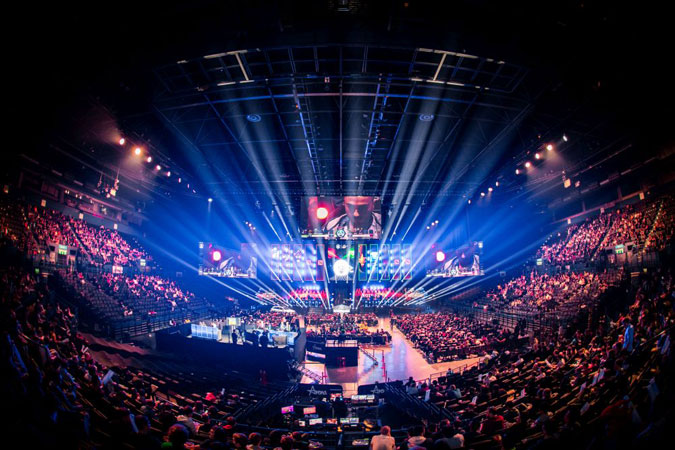
[ad_1]

reception. Each video garners 200,000 to 2.3 million views and gets thousands of comments. — SCREENSHOT VIA JAVALE MCGEE/YOUTUBE
By Mariel Alison L. Aguinaldo
HYBRID setups are the future of live sports and entertainment events, according to experts in the field.
“I think it won’t be a return to the previous live formats… It will be live plus digital. But at the same time, those who attend live, I think we would have discovered new digital ways in which they can also have a great experience even if they are in the same seminar room with hundreds of other people,” said Lionel Yeo, chief executive officer of sports, entertainment and lifestyle hub Singapore Sports Hub, during a Sept. 14 session in the online convention All That Matters.
Various institutions in the industry have already explored unique or alternative ways to hold their events. Following a pause since the outbreak, the National Basketball Association (NBA) resumed live games with a virtual audience. In the Philippines, telco provider Smart partnered with LIVENow, a pay-per-view service, to broadcast British singer Ellie Goulding’s virtual concert in August.
Live events with middle-sized audiences, which could be anywhere between 200 to a few thousand participants, may also become less popular. Organizers will want to capitalize either on the intimacy of a small group or the charged atmosphere of a large crowd.
“The energy of 10,000 people cheering together is something that you, for the foreseeable future, will not be able to replicate digitally… Who knows where Neuralink [a neurotechnology company developing implantable brain-machine interfaces] and other technology stuff will bring us a few decades? But with the technology we’re talking about right now, those live experiences are unique, they are emotionally special, and are creating a way that people even on the screens at home will see it, can relate to, and [are] important actually for all of live entertainment,” said Ralf Reichert, chief executive officer of ESLGaming, an electronic sports (esports) organizer and production company.
Coronavirus disease 2019 (COVID-19) caused devastating losses across the live sports and entertainment industry. Professional services firm Deloitte projects, for instance, that the Premier League football clubs in the United Kingdom may suffer a £500 million loss, a huge part of which is from matchday revenue. Pollstar, a live-event trade publication and research firm, calculates that the industry could lose up to $8.9 billion in revenue by the end of the year.
Leagues and clubs across different sports stopped operating with the onset of the pandemic, creating a pent-up fan demand for live sports content. While the gradual resumption of games and innovations in broadcasting production are satisfying fans for now, industry leaders must contemplate on producing new formats to sustain their engagement.
“Some commentators have suggested that fan interest now may need to take precedence…whether more reality TV, whether greater innovations in getting into the fan-content creation space, in order to create that level of interest to tell a story around sports,” Teck Yin Lim, chief executive officer of Sport Singapore, an agency under the Singapore Government that leads the development of a holistic sports culture for the country.
NBA players like JaVale McGee and Matisse Thybulle began vlogging their life during the pandemic, which was met with warm fan reception. Each video garners 200,000 to 2.3 million views and gets thousands of comments.

For this new era of engagement to happen, Mr. Lim believes that the industry first has to shift its perspectives.
“There’s still significant legacy mindsets in the sport industry so that by the end of this year, there will still be a lot of people waiting and wishing for COVID-19 to go away…But I’m optimistic that sport, being what it is, will think about this for longer term in terms of how we build greater resiliency in the industry. Because if this pandemic is anything to go by — and all of the commentators on the pandemic suggest that this is going to come and go — we have to make our shifts,” he said.
GREEN SCREENS

Professional video-game tournaments, which can fill 50,000-seat arenas, have migrated to the digital space. Two in-person competitions of the online game Dota 2, which were supposed to be held in the Shrine Auditorium in the United States and the Arena Birmingham in England, took place virtually in March and April. While Mr. Reichert said that 50% to 60% of the production of their events had already been digitized prior to COVID-19, the full transition to digital brought them various benefits.
“If you look…[at] the live sets that we’re having as a studio… they’re a hundred percent green-screen-produced. We can really see how we can produce mind-blowing quality which nearly feels like an event in a world where we actually have to produce with two people in one room, and everyone else is remote. These kinds of things will help us a lot going forward to produce more content and actually lower price points,” he said.
While the world waits for a vaccine to be made, the live sports and entertainment industry may use this time to re-evaluate the purpose of their industries and develop better practices for the future.
“What really are the deep impulses that drive humans to want to get together in a physical space? We can’t do that yet right now in a large scale, but we’re thinking about what does it mean when we can. In the meantime, there’s a lot of people who have been now sort of live to the potential of digital engagement…that’s not necessarily a bad thing because I believe we will then be much out of this pandemic with…a much better playbook for thinking about how do we create meaningful experiences,” said Mr. Yeo.
[ad_2]
Source link